
Mad is an American humor magazine first published in 1952. It was founded by editor Harvey Kurtzman and publisher William Gaines, launched as a comic book series before it became a magazine. It was widely imitated and influential, affecting satirical media, as well as the cultural landscape of the late 20th century, with editor Al Feldstein increasing readership to more than two million during its 1973–1974 circulation peak.

Robert Dennis Crumb is an American cartoonist who often signs his work R. Crumb. His work displays a nostalgia for American folk culture of the late 19th and early 20th centuries, and satire of contemporary American culture.
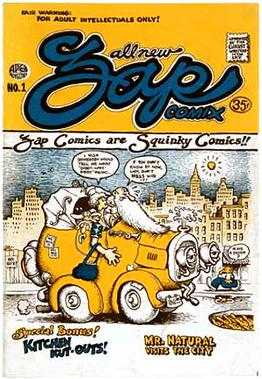
Underground comix are small press or self-published comic books that are often socially relevant or satirical in nature. They differ from mainstream comics in depicting content forbidden to mainstream publications by the Comics Code Authority, including explicit drug use, sexuality, and violence. They were most popular in the United States in the late 1960s and 1970s, and in the United Kingdom in the 1970s.

Trump was a glossy magazine of satire and humor, mostly in the forms of comics features and short stories. It was edited by Harvey Kurtzman and published by Hugh Hefner, with only two issues produced in 1957. The first issue appeared in January 1957 and the second came out in March. The magazine's mascot was a trumpeter herald in the style of John Tenniel's Alice in Wonderland illustrations. Kurtzman began work on Trump shortly after leaving Mad following a break with its publisher William M. Gaines. Mad also lost two of its top cartoonists in the dispute's aftermath, when Will Elder and Jack Davis chose to follow Kurtzman. Wally Wood was also recruited for the Trump team in the form of an either-or option, but he chose to stay at Mad. Other notable artists, including Al Jaffee and Arnold Roth, appeared in Trump.

Harvey Kurtzman was an American cartoonist and editor. His best-known work includes writing and editing the parodic comic book Mad from 1952 until 1956, and writing the Little Annie Fanny strips in Playboy from 1962 until 1988. His work is noted for its satire and parody of popular culture, social critique, and attention to detail. Kurtzman's working method has been likened to that of an auteur, and he expected those who illustrated his stories to follow his layouts strictly.

Weirdo was a magazine-sized comics anthology created by Robert Crumb and published by Last Gasp from 1981 to 1993. Featuring cartoonists both new and old, Weirdo served as a "low art" counterpoint to its contemporary highbrow Raw, co-edited by Art Spiegelman.
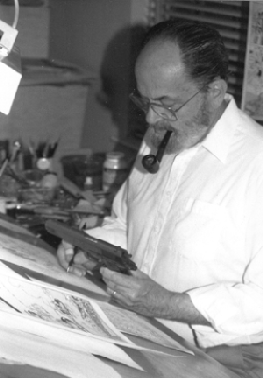
John Powers Severin was an American comics artist noted for his distinctive work with EC Comics, primarily on the war comics Two-Fisted Tales and Frontline Combat; for Marvel Comics, especially its war and Western comics; and for his 45-year stint with the satiric magazine Cracked. He was one of the founding cartoonists of Mad in 1952.
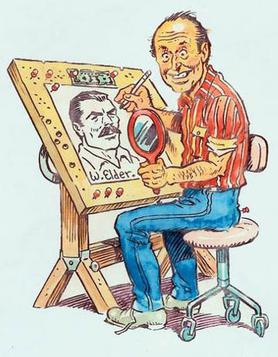
William Elder was an American illustrator and comic book artist who worked in numerous areas of commercial art but is best known for a frantically funny cartoon style that helped launch Harvey Kurtzman's Mad comic book in 1952.

Kitchen Sink Press was a comic book publishing company founded by Denis Kitchen in 1970. Kitchen Sink Press was a pioneering publisher of underground comics, and was also responsible for numerous republications of classic comic strips in hardcover and softcover volumes. One of their best-known products was the first full reprint of Will Eisner's The Spirit—first in magazine format, then in standard comic book format. The company closed in 1999.

Little Annie Fanny is a comics series by Harvey Kurtzman and Will Elder. It appeared in 107 two- to seven-page episodes in Playboy magazine from October 1962 to September 1988. Little Annie Fanny is a humorous satire of contemporary American society and its sexual mores. Annie Fanny, the title character, is a statuesque, buxom young blonde woman who innocently finds herself nude in every episode. The series is notable for its painted, luminous color artwork and for being the first full-scale, multi-page comics feature in a major American publication.

Humbug is a humor magazine published from 1957 to 1958. Edited by Harvey Kurtzman, the magazine took satirical jabs at movies, television, advertising and various artifacts of popular culture, from cereal boxes to fashion photographs. Nine of the eleven issues were published in a black-and-white comic book-sized format.
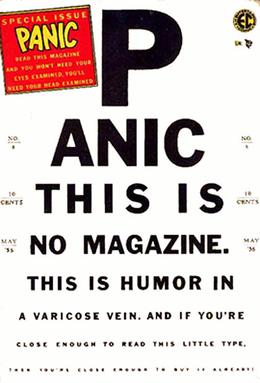
Panic was a bi-monthly humor comic that was published by Bill Gaines' EC Comics line during the mid-1950s as a companion to Harvey Kurtzman's Mad, which was being heavily imitated by other comic publishers.
Mervyn "Skip" Williamson was an American underground cartoonist and central figure in the underground comix movement. Williamson's art was published in the National Lampoon, High Times, the Realist, the Industrial Worker, the Chicago Seed, Encyclopædia Britannica and others. His best-known character is Snappy Sammy Smoot.
Debuting in August 1952, Mad began as a comic book, part of the EC line published from offices on Lafayette Street in Lower Manhattan. In 1961 Mad moved its offices to mid-town Manhattan, and from 1996 onwards it was located at 1700 Broadway until 2018 when it moved to Los Angeles, California to coincide with a new editor and a reboot to issue #1.
The following is a list of reference to Archie Comics in popular culture.
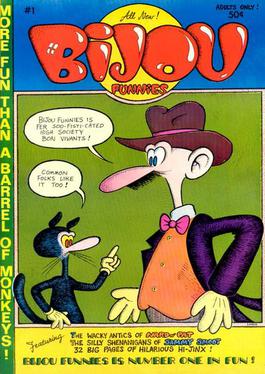
Bijou Funnies was an American underground comix magazine which published eight issues between 1968 and 1973. Edited by Chicago-based cartoonist Jay Lynch, Bijou Funnies featured strong work by the core group of Lynch, Skip Williamson, Robert Crumb, and Jay Kinney, as well as Art Spiegelman, Gilbert Shelton, Justin Green, and Kim Deitch. Bijou Funnies was heavily influenced by Mad magazine, and, along with Zap Comix, is considered one of the titles to launch the underground comix movement.

Harvey Kurtzman's Jungle Book is a graphic novel by American cartoonist Harvey Kurtzman, published in 1959. Kurtzman aimed it at an adult audience, in contrast to his earlier work for adolescents in periodicals such as Mad. The social satire in the book's four stories targets Peter Gunn-style private-detective shows, Westerns such as Gunsmoke, capitalist avarice in the publishing industry, Freudian pop psychology, and lynch-hungry yokels in the South. Kurtzman's character Goodman Beaver makes his first appearance in one of the stories.

Goodman Beaver is a fictional character who appears in comics created by American cartoonist Harvey Kurtzman. Goodman is a naive and optimistic Candide-like character, oblivious to the corruption and degeneration around him, and whose stories were vehicles for social satire and pop culture parody. Except for the character's first appearance, which Kurtzman did alone, the stories were written by Kurtzman and drawn by Will Elder.

American cartoonist Harvey Kurtzman was the founding editor and primary writer for the humor periodical Mad from its founding in 1952 until its 28th issue in 1956. Featuring pop-culture parodies and social satire, what began as a color comic book became a black-and-white magazine with its 24th issue.

Patsy Walker is a comic book title featuring the character Patsy Walker originally published by Timely Comics beginning in 1945, by Atlas Comics from 1951 to 1961, and later by Marvel Comics.

















